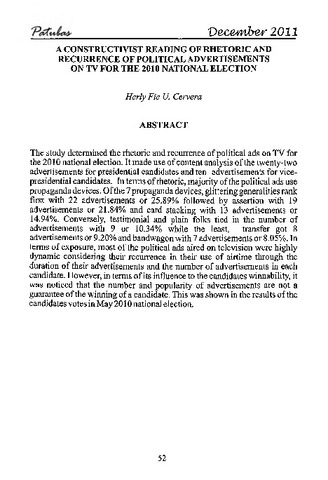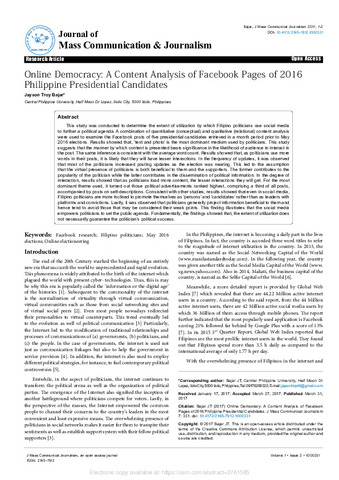An analysis of presidential candidates’ Facebook posts during the 2022 Philippine National Election

Page views
547Date
2023Auteur
Thesis Adviser
Defense Panel Chair
Share
Metadata
Afficher la notice complète
Résumé
The 2022 Philippine National Election witnessed a significant shift in political communications and campaigning strategies due to the utilization of Facebook. Utilizing the Facebook posts of Ferdinand “Bongbong” Marcos, Jr. and Maria Leonor “Leni” Robredo during the election period, this study conducted a quantitative research approach employing content analysis to explore the candidates' use of the platform, including the prevalent themes, types of media employed, frequency of posting, and the level of engagement through comments, shares, and reactions. Results of this study showed that Robredo posted more than Marcos, yet both candidates posted majorly proliferated posts focusing on "Election Campaigns and Political Advertisements." The prevailing media formats used by both candidates are a combination of text and photos, aligning with digital literacy, especially in creating and communicating digital content through multimedia. Marcos introduced vlogs with text, and Robredo experimented with Text, Photos, Video, and Links. As the election date drew closer, both candidates intensified their Facebook posting activities, with Robredo maintaining a high posting frequency, surpassing Marcos in this regard. However, Marcos achieved greater user engagement, primarily attributable to disparities in their respective followership sizes. User engagement predominantly manifested as reactions, with distinct patterns observed in the frequency of comments and shares between the two candidates.
Description
Abstract only
Suggested Citation
Palcullo, V. E. V. (2023). An analysis of presidential candidates’ Facebook posts during the 2022 Philippine National Election [Unpublished master's thesis]. Chulalongkorn University.
Type
ThesisSujet
Presidential candidates  ; Presidents--Election
; Presidents--Election  ; Political campaigns
; Political campaigns  ; Political campaigns--Technological innovations
; Political campaigns--Technological innovations  ; Communication in politics
; Communication in politics  ; Politics in social media
; Politics in social media  ; Social media--Political aspects
; Social media--Political aspects  ; Facebook (Electronic resource)
; Facebook (Electronic resource)  ; Internet in political campaigns
; Internet in political campaigns  ; Content analysis (Communication)
; Content analysis (Communication)  ; Digital media--Political aspects
; Digital media--Political aspects  ; Advertising, Political
; Advertising, Political 
Keywords
Department
Faculty of Arts, Chulalongkorn UniversityDegree
Master of Arts in Information StudiesShelf Location
Z 669.7 .P35 2023
Physical Description
xiii, 164 leaves. : ill. (col.).
Collections
- Theses [6]
Related items
Showing items related by title, author, creator and subject.
-
Political communications and promotions: Its influence to the voting inclination and preference of perceived candidates of the residents of the city of Iloilo
Tupas, Nielex C. (2009)This study aimed to determine the extent of influence of political communication and promotions to the voting inclination and preference of candidates. The research is descriptive-relational as it describes certain ... -
A constructivist reading of rhetoric and recurrence of political advertisements on TV for the 2010 national election
Cervera, Herly Fie U. (Central Philippine University, 2011-12)The study determined the rhetoric and recurrence of political ads on TV for the 2010 national election. It made use of content analysis of the twenty-two advertisements for presidential candidates and ten advertisements ... -
Online democracy: A content analysis of Facebook pages of 2016 Philippine presidential candidates
Bajar, Jayson Troy F. (Hilaris, 2017)This study was conducted to determine the extent of utilization by which Filipino politicians use social media to further a political agenda. A combination of quantitative (conceptual) and qualitative (relational) content ...




